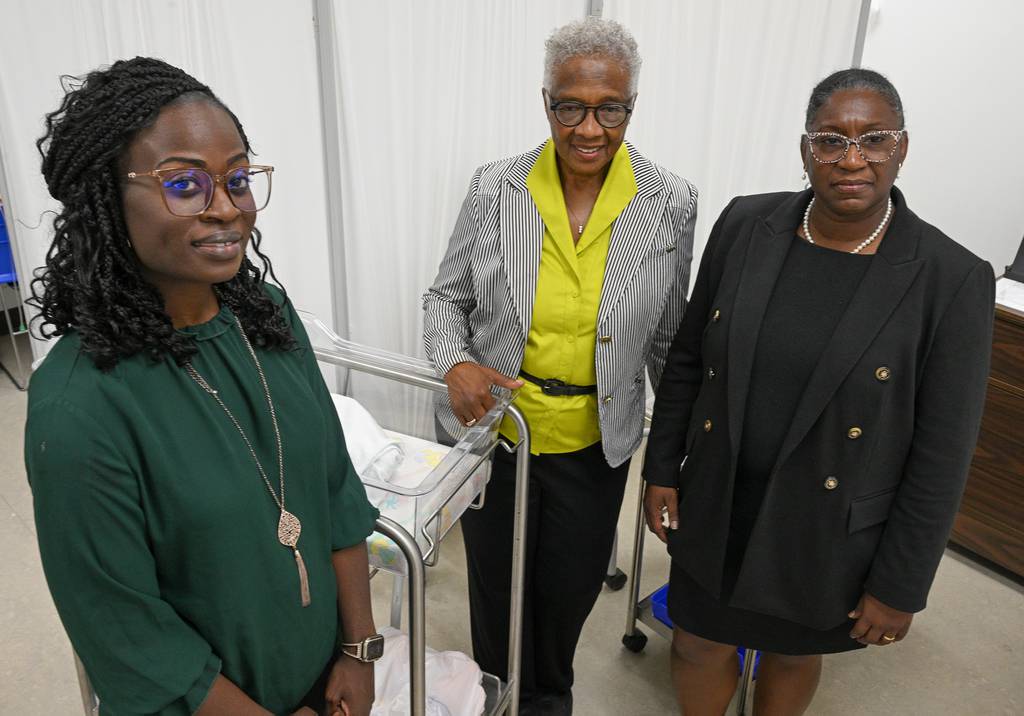The topic of babies came up when Kesha Baptiste-Roberts was chatting recently with a young woman working the counter at a makeup store in the mall.
The worker, a Black woman, told Baptiste-Roberts she didn’t want to get pregnant. Not because it wasn’t the right time for her, or because she didn’t want kids. Because she didn’t want to die.
“I was standing there, thinking that this is crazy,” recalled Baptiste-Roberts, an associate professor for Morgan State University’s School of Community Health and Policy. “I thought, ‘Something is wrong here.’”
It has long been more dangerous for a woman to be pregnant or give birth in the United States than any other developed nation in the world. For Black women, regardless of how much money they make or how many degrees they have, the risk of dying from pregnancy-related complications is three times that of white women.
But researchers at Morgan State, the largest of Maryland’s historically Black colleges and universities, soon will be on the front lines of working to reduce this disparity.
The Health Resources and Services Administration — part of the U.S. Department of Health and Human Services — recently announced it would distribute $50 million to Morgan State and 15 other minority-serving institutions across the country over the next five years to establish research centers to study maternal health.
Morgan State received $3 million from the agency, more than other institutions, when the funds were announced Sept. 27 because its Northeast Baltimore research center, led by Baptiste-Roberts, also will house a center that will coordinate the activities of all 16 research programs.
Other research centers will be at HBCUs in Washington, D.C.; Alabama; Florida; Georgia; Mississippi; Tennessee, and Texas, and at Hispanic-serving institutions in California, Florida, New York and Texas. Additional centers will be located at institutions that serve Asian Pacific Islanders in Hawaii and Texas.
For many years, HBCUs and other minority-serving institutions have helped predominantly white institutions conduct research on maternal and infant health, said Yvonne Bronner, a professor at Morgan State’s School of Community Health and Policy who will lead the coordinating center.
But previously, she said, their main role has been in outreach and community engagement. The federal funding will help the institutions — which teach and employ people whose communities experience the disparities they will be studying — build the capacity to conduct their own research and compete against predominantly white institutions for grants.
“That is truly exciting,” Bronner said. “We waited a long time.”
The windfall came after more than two decades of collaboration between HBCUs with public health programs.
Shortly after Bronner arrived at Morgan State to launch its public health program, she learned the university would be ineligible for many funding opportunities because it didn’t have a school of public health. Realizing there were many HBCUs in the same boat, Bronner helped establish the Consortium of African American Public Health Programs, which included about 20 universities.
Then, in 2021, some of the universities involved in the consortium formed the HBCU Alliance Team for Maternal, Child and Family Health to start pushing to bring research on the subject to minority-serving institutions, Bronner said. She credits the support of Health Resources and Services Administration officials and the Biden administration’s White House Blueprint for Addressing the Maternal Health Crisis for bringing the “unheard of” research funding to the institutions.
The first year of funding, close to $9.8 million, will help the 16 research centers build teams of researchers and dig into the state of maternal health in each region where they’re located. The centers also hope to draft a strategic plan by the end of the year to determine how they will work together to help lower maternal mortality and morbidity.
The next year, the research centers will work with community members, organizations and other stakeholders to understand their regions on a deep level and ensure that any programs they create emerge from community input. For the last three years, the centers will implement the findings of their research and set up projects to last beyond the grant period.
The Morning Sun
Daily
Get your morning news in your e-mail inbox. Get all the top news and sports from the baltimoresun.com.
“The single most important thing that has to come out of the last three years is sustainability,” Bronner said. “Our communities are just littered with projects that were five years and ended. As soon as we start to make progress within our communities, the project ends. We’re going to be starting right now — building our funding base, building our literature base, building our research base — so that we can sustain this initiative into the future.”

Marilyn Berchie-Gialamas, an assistant professor in Morgan State’s Department of Nursing who will be working with the school’s research center, was recently awarded $333,000 from the federal Centers for Medicare and Medicaid Services’ Office of Minority Health to examine barriers that prevent underserved women from accessing doula services during their birth experiences.
During the project, researchers will conduct focus group interviews with minority women living in Baltimore who have had a live birth within the past two years, as well as with doulas who have served at least two years in the city. Given that doula services are now covered by Medicaid in Maryland, Berchie-Gialamas hopes the study can help CMS identify ways to improve access to the professionals, who are nonclinical and provide physical, emotional and informational support to birthing parents.
“Maybe the doulas aren’t getting funded enough. Maybe there aren’t enough certified Medicaid ones for the people who need the services,” Berchie-Gialamas said. “I just really wanted to inform Medicaid specifically and the community as a whole on how we can really utilize doula services to help improve maternal morbidity and mortality.”
Outside of the doula study, Baptiste-Roberts hopes the federal funding will help build research capacity at HBCUs, which are blooming with talent but have been under-resourced for a long time. She also hopes the centers result in researchers of color getting recognized for their hard work with awards.
Ultimately, she said, she hopes the project makes people’s lives better.
“I really don’t want to meet another young person that’s afraid to be pregnant because they think they’re going to die,” she said.
This post was originally published on this site be sure to check out more of their content.








